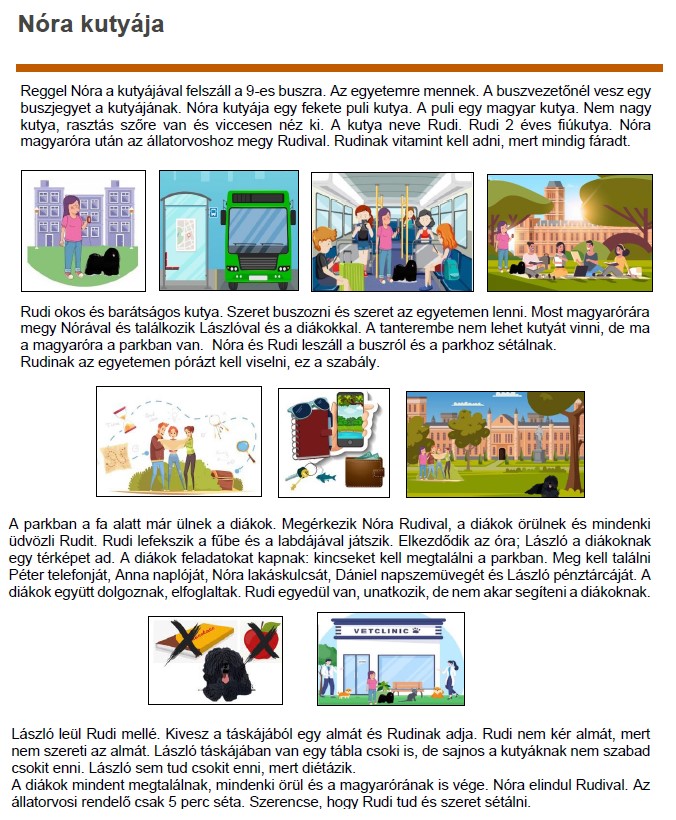Chapter 7 – Part 1 – Nóra kutyája

Pronunciation warm up
Random words – 2 – single or double consonant practice
Vocabulary – Practice the pronunciation of the following words
Focus on the compound words
Keep in mind: stress is always placed on the first syllable of a word.
Reading text

Note: noun+accusative -t, possessive personal pronouns (singular -m, -d, ja/je), conjugation (present definite), helping verbs +ni
Listening
audio/video – TBA
Dictation
Nóra kutyája
Reading – Read the text and learn the new vocabulary
Nóra kutyája
Reggel Nóra a kutyájával felszáll a 9-es buszra. Az egyetemre mennek. A buszvezetőnél vesz egy buszjegyet a kutyájának. Nóra kutyája egy fekete puli kutya. A puli egy magyar kutya. Nem nagy kutya, rasztás szőre van és viccesen néz ki. A kutya neve Rudi. Rudi 2 éves fiúkutya. Nóra magyaróra után az állatorvoshoz megy Rudival. Rudinak vitamint kell adni, mert mindig fáradt.
Rudi okos és barátságos kutya. Szeret buszozni és szeret az egyetemen lenni. Most magyarórára megy Nórával és találkozik Lászlóval és a diákokkal. A tanterembe nem lehet kutyát vinni, de ma a magyaróra a parkban van. Nóra és Rudi leszáll a buszról és a parkhoz sétálnak. Rudinak az egyetemen pórázt kell viselni, ez a szabály.
A parkban a fa alatt már ülnek a diákok. Megérkezik Nóra Rudival, a diákok örülnek és mindenki üdvözli Rudit. Rudi lefekszik a fűbe és a labdájával játszik. Elkezdődik az óra; László a diákoknak egy térképet ad. A diákok feladatokat kapnak: kincseket kell megtalálni a parkban. Meg kell találni Péter telefonját, Anna naplóját, Nóra lakáskulcsát, Dániel napszemüvegét és László pénztárcáját. A diákok együtt dolgoznak, elfoglaltak. Rudi egyedül van, unatkozik, de nem akar segíteni a diákoknak.
László leül Rudi mellé. Kivesz a táskájából egy almát és Rudinak adja. Rudi nem kér almát, mert nem szereti az almát. László táskájában van egy tábla csoki is, de sajnos a kutyáknak nem szabad csokit enni. László sem tud csokit enni, mert diétázik.
A diákok mindent megtalálnak, mindenki örül és a magyarórának is vége. Nóra elindul Rudival. Az állatorvosi rendelő csak 5 perc séta. Szerencse, hogy Rudi tud és szeret sétálni.
Practice exercises
1. Find the noun with the possessive personal ending
2. Put the sentences in order
3. Add the correct possessive personal ending to the noun
4. Igaz vagy hamis?
Grammar bites
1. DATIVE CASE
The dative of nouns is formed by adding the suffix -nak, nek to a nominal form of the noun. Common words are used with Dative:
| ad | mond | hoz | visz | küld | mutat | köszön | örül | tetszik |
| (s)he gives | (s)he says | (s)he brings | (s)he takes | (s)he sends | (s)he shows | (s)he thanks | (s)he glads | (s)he likes |
2. POSSESSIVE – GENERAL
The function of possessive structures is the same in Hungarian as in English. The possessive relation consists of two words of a word group: the noun-possessor “a lány”, precedes the modified noun-possessed “kutyája”. In English, the noun-possessor is expressed by the ‘s or s’ of the genetive or by using the preposition of. The possession is found not in the possessor but in the thing possessed.
3. POSSESSIVE AND DATIVE ENDING
There is hardly any difference between the two forms (nominative and dative) of the noun-possessor.
The form: “a lány kutyája” may be regarded as the abbreviated form of the construction: “a lánynak a kutyája”. However, the suffixless form is more generally used. The form with the suffix -nak, nek is preferred when the possession has special stress or especially when there are several things possessed: “a lány kutyájának az állatorvosa”
4. POSSESSED NOUN AND OTHER ENDINGS
All suffixes (accusative, three-location endings, instrumental) can be added to the noun-possessed: “A lány kutyájával játszanak a diákok.”
Did you know? – Culture Corner
Animal breeds originated in Hungary
– marha – cattle – Magyar Szürke “Hungaran Grey”
– kutya – dog – Komondor, Kuvasz, Magyar Agár, Mudi, Puli, Pumi, Transylvanian Hound, Vizsla
– ló – horse – Gidrán, Mezőhegyesi félvér, Magyar sportló, Kisbéri félvér
– disznó, malac – pig – Mangalica
– galamb – pigeon – Budapest Short-faced Tumbler, Félegyháza Tumbler, Szegedin Highflyer
– juh, birka – sheep – Cikta, Racka, Cigája
his/her dog
morning
with his/her dog
(s)he gets on [the bus]
on bus (number) 9
to (the) university
at (the) busdriver
(s)he buys
bus ticket
for his/her dog
black
dog
(s)he has dreadlocks
it looks funny
the dog's name
two-years old
male dog
(s)he goes (to) the vet
must, have to
to give
because
smart
friendly
(s)he likes to take (the) bus
to be
not possible/not allowed
to take
(s)he gets off [the bus]
to (the) park
leash
to wear
rule
under (the) tree
students
they are happy
(s)he greets/welcomes (him/her)
(s)he lies down
into (the) grass
(s)he plays with a ball
(s)he starts/begins
map
(s)he gives
exercises
they get
treasures
to find
to find
his/her phone
his/her diary
his/her apartment key
sunglasses
his/her wallet
(they) are busy
alone
(s)he is bored
(s)he doesn't want
to help
(s)he sits down
next to
(s)he takes out
from his/her bag
apple
(s)he doesn't ask for apple
chocolate bar
neither
can
chocolate
(s)he is on (a) diet
they find
(s)he is happy
end
(s)he departs
veteranary office
luckily
to walk
